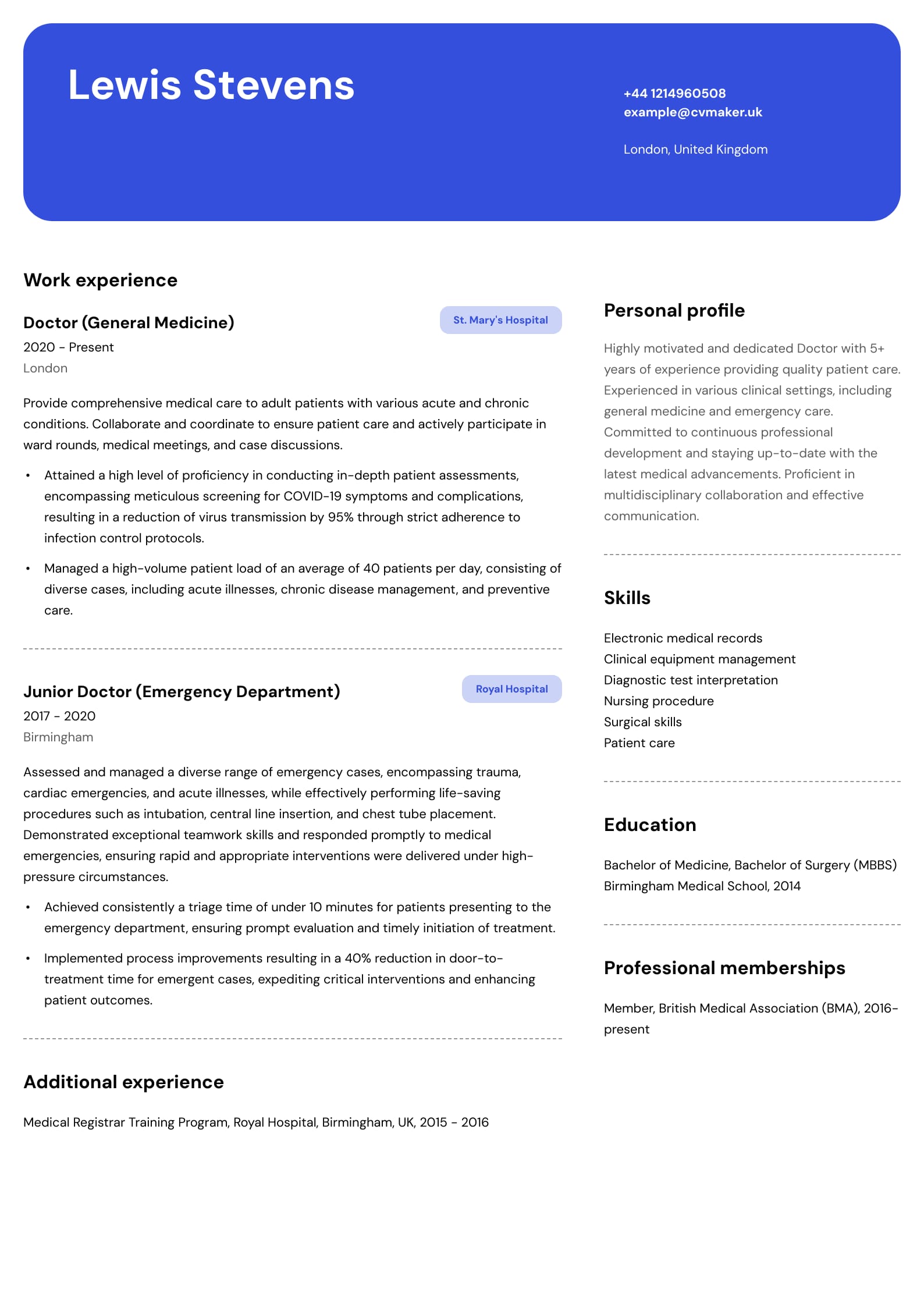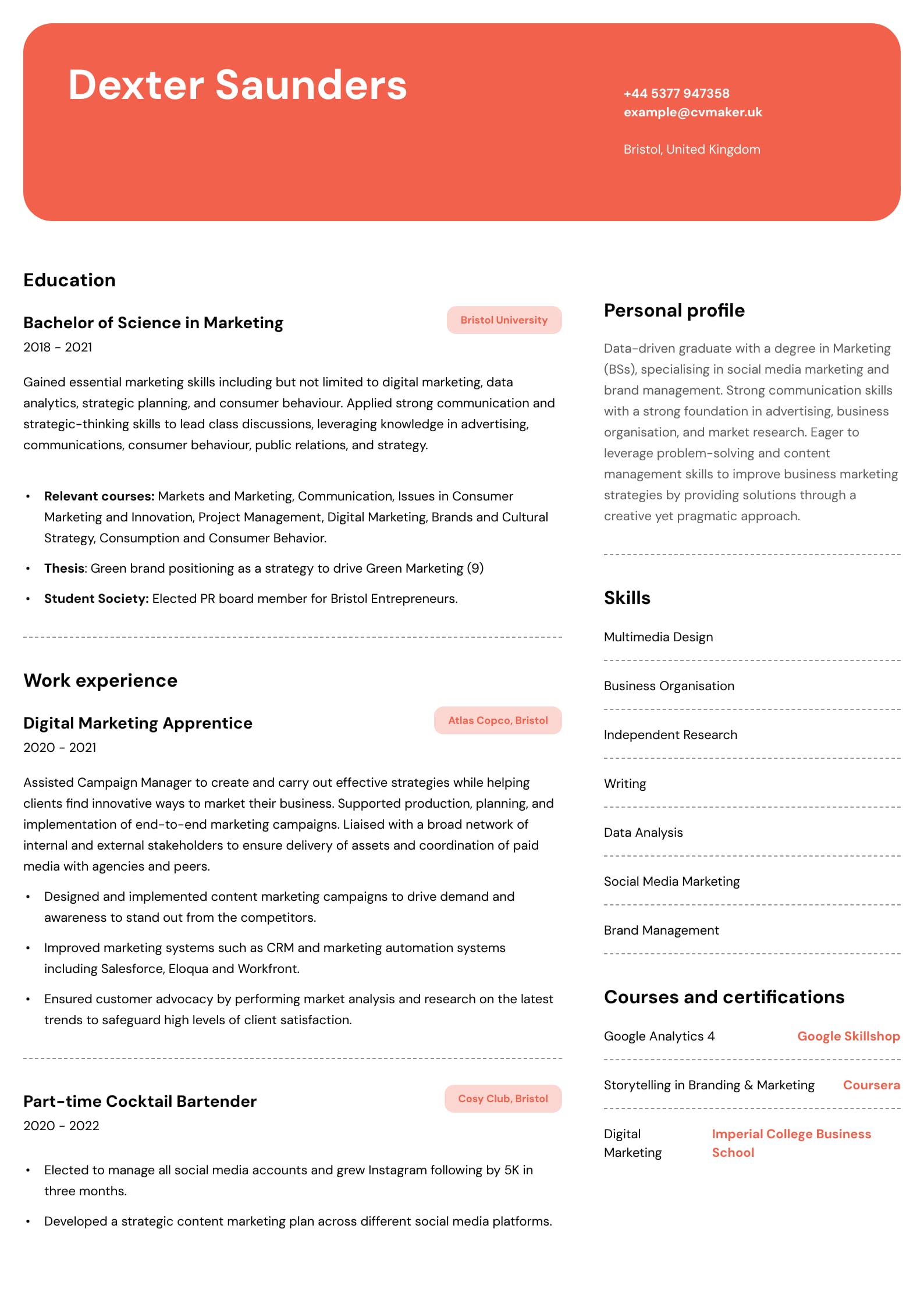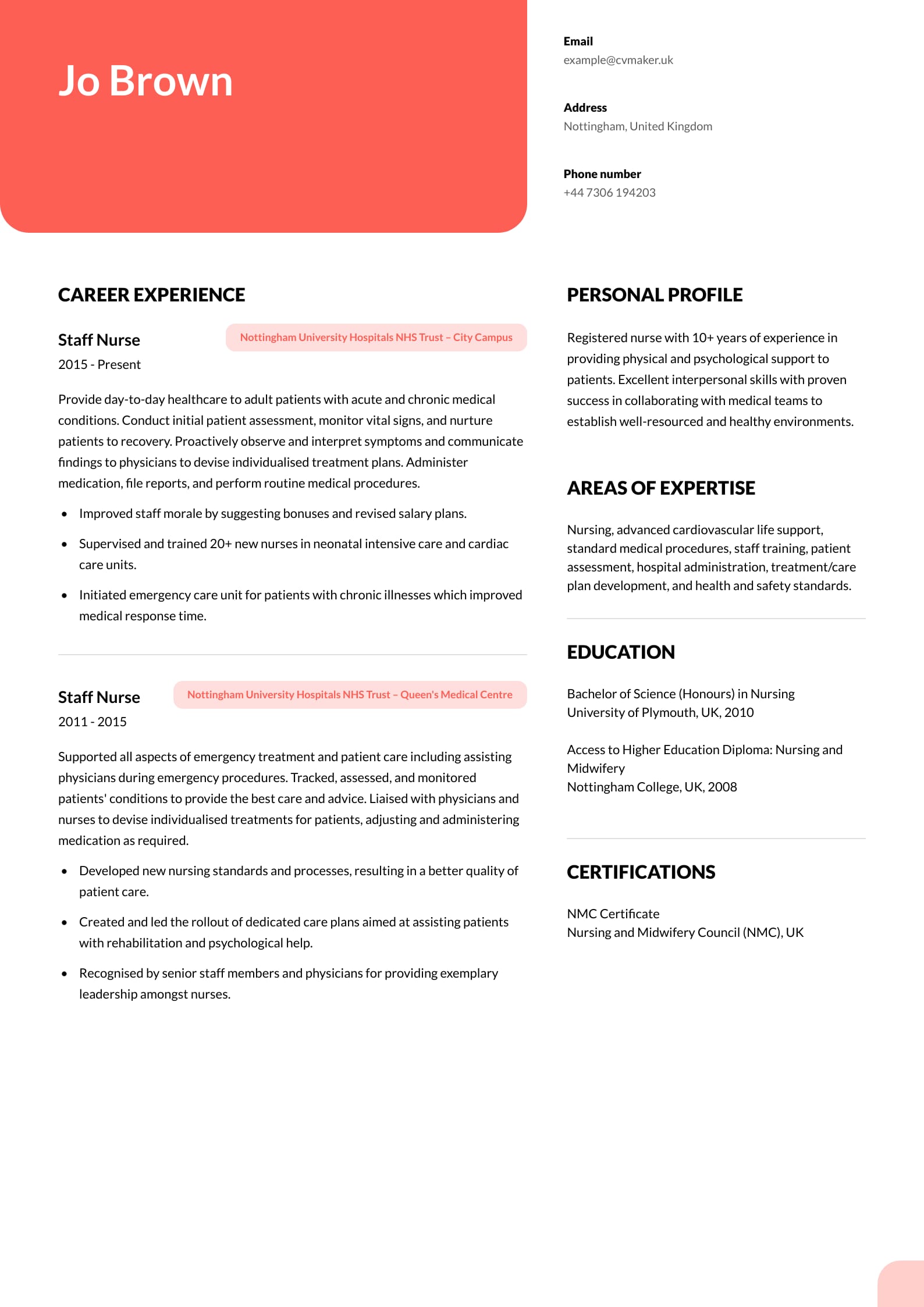
How to Write a GP CV: Tips for a Successful Job Search
With over 37,000 General Practitioners (GPs) working across the UK, the demand for their services is steadily rising in both the NHS and private medical sectors. The role of a GP is not just influential, but also crucial, making it one of the most influential positions in the UK healthcare industry.
If you're passionate about providing frontline care to leading community health initiatives and want to support a wide range of patients across all life stages, writing a good CV is your first step to standing out to healthcare recruiters.
Whether you're still in training, newly qualified, or an experienced GP, a clear and well-structured, modern CV can set you apart. It's not just a document, but a powerful tool that can give you control over your job application process. Most hiring managers and employers now utilise recruitment tools like application tracking systems (ATS), so your CV must be professionally formatted to meet these requirements.
In this article, we’ll guide you through:
What essential sections to include and how to format your GP CV.
How to list work experience, general practitioner skills, and education.
How to write a CV for general practitioner jobs with little to no experience, including junior GP CV tips.
Sample wording for a strong general practitioner CV personal statement.
How to highlight soft skills, technical knowledge, and notable achievements.
A good example of a CV template for an NHS GP.
Streamline your CV writing process with CVMaker, featuring intuitive designs and advice on how to choose the best CV template.
Customise this GP CV example
GP CV example
 Download this general practitioner CV pdf.
Download this general practitioner CV pdf.
In this GP CV sample, Nylah Rees outlines her career progression from Foundation Doctor to General Practitioner using the Cornell CV template. Key sections such as clinical skills, patient care experience, and key achievements are well-formatted. This professional GP CV example is ideal for NHS roles, showcasing strong communication, teamwork, and a solid educational background.
What to include in a GP CV?
When writing a GP CV, include your medical qualifications, GMC registration, and relevant licences. International medical graduates should also list visa status, nationality, and proof of English language proficiency. For clarity, add details like “Right to work in the UK – Skilled Worker Visa holder” in your contact information section.
Must-have CV sections
Personal profile
Skills section
Work experience
Education
Learn more about how to write a good CV.
Here are the key sections to include in a GP CV example:
Contact details: include your full name, professional email address, mobile number, and an optional LinkedIn profile if it reflects your professional career. You do not need to include your full address on a CV or a CV photo.
Personal profile: summarise years of experience, career goals, specialist training, and key soft skills. Include your professional interests, such as women’s health, fitness or community-based care.
Education: list your medical degree, including the institution, graduation year, and any postgraduate training. Mention the completion of your foundation programme, GP training scheme, and other relevant qualifications, such as MRCP/MRCGP.
Work experience: Describe your previous experience in detail and include responsibilities such as patient care, MDT meetings, diagnostics, or QOF audits.
Skills section: highlight technical skills (e.g. use of EMIS, SystmOne, referral protocols) and soft skills such as leadership, resilience, and collaboration.
Professional memberships: include membership numbers or status with the GMC, BMA, or RCGP, where applicable.
Additional information: use this optional section to add value, such as a portfolio, audits, clinical governance, publications, DBS certification, CPD courses, languages spoken, or evidence of safeguarding training. If applying as an IMG, add IELTS/OET scores and visa information.
For a more comprehensive overview, refer to our guide on how to start with a master CV, a detailed document that serves as the foundation for creating targeted CVs for specific roles.
How to list general practitioner skills on a CV
Your skills on a CV are crucial for highlighting what makes you the ideal candidate for a specific role. Be sure to include both technical skills and top soft skills, such as communication and adaptability, coupled with sought-after hard skills like foreign languages and administration.
Your GP CV should reflect the job description, healthcare values and frameworks that emphasise patient-centred care, safety, and equality. Include a strong balance of technical expertise, interpersonal skills, and ethical commitment to impress healthcare recruiters. To make your skills more impactful, refer to action verbs such as “assessed,” “coordinated,” “prescribed,” “led,” and “advised” when describing duties and outcomes.
Essential GP skills (with definitions)
Patient-centred care: Commitment to providing tailored, compassionate care that meets individual patient needs.
Clinical diagnosis: Ability to assess symptoms and formulate accurate treatment plans under pressure.
Multidisciplinary collaboration: Experience working with nurses, specialists, and allied health professionals to improve outcomes.
Prescribing and medication management: Sound knowledge of UK prescribing protocols, particularly in primary care.
Communication: Excellent verbal and written skills with patients, families, and colleagues.
Use your personal profile to showcase soft skills in action
“Empathetic and adaptable GP Registrar with proven ability to manage complex patient cases while collaborating within high-pressure NHS clinics.”
| Hard skills | Soft skills |
|---|---|
| Chronic disease management (diabetes, COPD, hypertension) | Empathy and active listening |
| Conducting patient consultations, risk assessments, and reviews | Problem-solving and clinical decision-making |
| Immunisations and travel health assessments | Teamwork across clinical environments |
| CQC compliance and record-keeping | Adaptability in high-pressure settings |
| Preventative screening and health education | Time management |
| Use of IT and clinical systems (e.g. EMIS, SystmOne, Docman) | Emotional resilience |
You can also integrate these skills into your experience section
“Delivered chronic disease reviews using EMIS, contributing to improved patient engagement and 98% QOF compliance.”
How to write a personal profile for a GP CV
Within your CV personal profile, it is essential to highlight core GP-specific soft skills and use keywords from the job description to grab the attention of recruiters or hiring managers. This section should:
Summarise your clinical expertise
Patient care approach
Ability to work across primary health and social care environments.
Where possible, provide evidence of how you’ve applied your skills in general practice, whether through training, locum work, or NHS placements.
Personal profile on a CV
Whether you are a student, a graduate, or a seasoned professional, a personal profile is essential for your CV when targeting the UK job market. This statement should grab the attention of employers and set you apart from other applicants.
Learn more about how to successfully pitch yourself in a personal profile.
Include soft skills and keywords to highlight your qualities:
"Compassionate and detail-focused Foundation Year 2 GP trainee, committed to delivering evidence-based care and managing a diverse patient caseload in busy urban GP surgeries."
"Adaptable and collaborative GP Registrar with excellent clinical reasoning, communication and patient rapport-building skills, proven through experience in general practice and out-of-hours care."
Mention how you’ve applied your skills successfully in relevant contexts:
"Foundation Year GP who supported preventative health initiatives and chronic disease clinics while managing acute presentations independently under supervision."
"GP Registrar who led patient consultations and medication reviews, working closely with senior GPs and practice nurses to optimise care pathways and improve patient satisfaction."
General Practitioner CV personal profile example
Dedicated General Practitioner with 7 years of experience and strong communication skills and a patient-first approach. Experienced in primary care, preventative health, and chronic disease management. Committed to delivering evidence-based care and working collaboratively in multidisciplinary teams. Proven ability to remain calm under pressure and adapt to fast-paced clinical settings.
Assistant Practitioner CV personal profile example
Compassionate Assistant Practitioner with 4 years of hands-on experience supporting patient assessments, triage, and minor procedures in GP surgeries. Demonstrates excellent communication and time management skills. Passionate about improving patient experience and supporting GPs in day-to-day operations through accurate record-keeping and patient education.
Specialist Practitioner CV personal profile example
Experienced Specialist Practitioner with 10+ years of experience and a focus on long-term condition management and community-based healthcare. Skilled in patient education, care planning, and multidisciplinary collaboration. Brings deep understanding of health promotion and risk reduction strategies, supporting holistic care delivery in GP settings.
Associate Practitioner CV personal profile example
Motivated and adaptable Associate Practitioner with 2 years of experience in clinical environments, including primary care and outpatient clinics. Confident in assisting with diagnostics, wound care, and health screening. A strong team player who ensures patient dignity and delivers compassionate care across diverse settings.
Foundation GP CV personal profile example
Enthusiastic Foundation GP trainee with a solid grounding in clinical rotations across general medicine, A&E, and psychiatry. Brings attention to detail, critical thinking, and empathy to every consultation. Keen to develop diagnostic and communication skills within a supportive primary care environment.
Work experience to include on a general practitioner CV
Your work experience section is often the first section recruiters read, so structure it carefully using reverse chronological order, beginning with your most recent or current role. Describe your roles in detail using action verbs, and include responsibilities such as patient care, MDT meetings, diagnostics, or QOF audits.
What should each work experience entry include?
Job title of current or previous role
Organisation name and location
Dates of employment (month/year)
A concise paragraph detailing your duties
Followed by 2–3 bullet points that highlight your key achievements or measurable impact.
Learn more about the work experience section in a CV.
Highlight achievements on your CV with bullet points (e.g. improved patient satisfaction scores or reduced waiting times). Use metrics whenever possible (e.g. patient volume, efficiency gains, audit outcomes) to demonstrate measurable results.
Good versus bad achievement examples for work history
Good
“Implemented a new booking triage template, reducing average patient wait times by 20%.
Bad
“Helped the team during busy periods.”
Good
“Supported asthma reviews for 75+ patients, improving ICS adherence by 30%"
Bad
“Assisted in patient reviews and used inhalers.”
If you're an experienced general practitioner, include positions in primary care, urgent care, or specialist outpatient clinics. However, if you’re newly qualified or with little to no experience to include in a CV, highlight:
Clinical placements (especially in general practice)
Internships or apprenticeships in medical environments
Volunteer work in the NHS or private healthcare
University-based medical roles (e.g. peer-led clinics or simulation labs).
If you’re applying for your first job post-training, don’t worry about filling every line with paid employment. Instead, showcase transferable and clinical skills developed through relevant experience, even if part-time or voluntary.
GP CV work experience examples
General Practitioner (Salaried GP), Riverbank Medical Practice, Leeds, 2020-present
Deliver comprehensive, person-centred care in a busy NHS practice, handling a varied caseload of chronic, acute, and preventative health concerns. Regularly conduct telephone triage, face-to-face consultations, and home visits while ensuring continuity of care and holistic treatment planning. Liaise with district nurses, pharmacists, and secondary care providers to ensure efficient referrals and safeguarding protocols are maintained.
Achieved a 96% patient satisfaction score in the annual practice survey by improving continuity and patient communication.
Led an initiative to streamline the repeat prescription system, reducing prescription queries and medication errors by 25%.
GP Foundation Year 2 (FY2), City Health Clinic, London, 2022-2024
Completed clinical rotations in general practice, paediatrics, and psychiatry. Managed patient consultations under supervision, practised safe prescribing, participated in MDTs, and supported public health initiatives. Developed clinical reasoning, documentation accuracy, and ability to work effectively under time pressure.
Assisted in redesigning patient triage flow, improving patient wait times by 15%.
Supported local flu vaccination programme, helping increase uptake in target groups by 10%.
GP Registrar, Meadowgate Surgery, Birmingham, 2019-2025
Delivered patient consultations while supported by experienced GPs. Focused on building experience in long-term condition management, safeguarding vulnerable adults, and understanding the broader implications of health inequalities. Maintained accurate clinical documentation and reflected on feedback to continually improve performance.
Initiated a medication review project for polypharmacy patients, reducing adverse effects by 18%.
Received practice award for demonstrating exceptional compassion and communication in end-of-life care cases.
Associate Practitioner (Outpatient Services), NHS Trust, Sheffield, Jan 2023-2025
Worked under the guidance of registered practitioners to support diagnostic and treatment planning for patients attending outpatient clinics. Helped with routine assessments, documentation, and administrative functions. Offered patient guidance on health promotion and follow-ups.
Helped reduce clinic backlog by 20% during peak winter season through scheduling improvements.
Delivered staff training in the use of new patient management software, increasing data accuracy.
How to include education on a GP CV
When listing your education on a CV, it's essential to display your qualifications, starting with your most recent medical degree and working backwards. Even if you are a newly qualified doctor or have several years of experience, education is an essential part of your CV.
Pro Tip
If you're an international applicant, always include the country next to your medical degree and training – e.g. MBBS, University of Delhi, India. This helps employers quickly understand your qualifications and speeds up verification, especially in regulated fields like healthcare.
How to format educational qualifications
Degree
[Degree title], [Institution], [Location], [Year of graduation]
Bachelor of Medicine, Bachelor of Surgery (MBBS), University of Birmingham, Birmingham, UK, 2015-2020
A-Levels
[Qualification name], [Institution], [Location], [Years completed]
A Levels, Biology (A), Chemistry (A), Maths (B)Walsall Sixth Form College, West Midlands, UK, 2015-2017.
Tips for graduates or entry-level GPs:
List all relevant student placements or rotations, especially in GP settings.
Include shadowing or clinical apprenticeships
Mention extracurricular roles with health charities or public health initiatives.
Volunteer in community clinics or outreach services. Many NHS trusts support student placements or internships.
Add part-time roles that utilise transferable soft skills, such as communication and organisation.
Learn more about how to write a graduate CV.
General practitioner certifications on a CV
Courses and certificates on a CV validate your training and specialisation, beneficial for showcasing continued professional development or eligibility to practice in the UK. List certifications separately from your education under a heading like Certifications or Courses & Training.
Examples:
RCGP – Membership of the Royal College of General Practitioners, Royal College of General Practitioners (RCGP), 2023
Advanced Life Support (ALS), Resuscitation Council UK, 2022
GP Induction & Refresher Scheme, NHS England, In Progress
GMC Registration, General Medical Council, Full Licence to Practise – 2020.
If you're applying as a foreign-qualified GP, include your IELTS or OET scores, and list your visa eligibility or GMC registration status to reassure recruiters. Explore our blog for more information on job opportunities for international students in the UK.
Essentials for a GP CV
Crafting an effective GP CV is crucial to standing out in the UK's competitive and in-demand sectors. Highlight your clinical expertise, certifications, and commitment to patient care. Tailor each application to the job description to increase your chances of landing a job interview with the NHS or private practices.
Dos and don’ts for a GP CV
Dos
Add references if employers request this in the job post.
Use clear contact details like your mobile number and professional email address.
Keep it concise – ideally under two sides of A4 for the best CV length.
Don’ts
Add unnecessary personal info like a photo or full address.
Avoid unprofessional fonts and colours.
Forget to proofread. Spelling or grammar errors can cost you interviews.
Next steps?
Need help choosing a layout? Browse our professional CV examples in healthcare or build yours using our CV Builder. Explore how to improve your CV and how to write an impactful medical cover letter. Stay organised by reading our blog on how to track job applications, send your CV via email and practice NHS interview questions. Expand your professional reach by leveraging the power of networking and exploring the best job fairs in the UK to enhance your career prospects.
FAQs
How long is GP training?
GP training in the UK typically lasts five years, comprising two years of foundation training followed by a three-year GP speciality training programme (GPST).
What is the average salary of a GP in the UK?
According to the NHS, the average salary for a salaried GP ranges from £68,975 to £104,085, depending on experience and location.
How can a foreign GP work in the UK?
Overseas-qualified GPs must register with the General Medical Council (GMC), meet English language requirements, and complete relevant assessments such as PLAB or a recognised postgraduate qualification.
Is being a GP in the UK worth it?
GPs enjoy a stable career with diverse clinical responsibilities, a good work-life balance, and a substantial community impact, although workload and NHS pressures can be high.
How do I apply to become a GP?
To become a GP, you must complete a medical degree, the foundation programme (FY1 and FY2), and apply for GP speciality training (ST1-ST3) through Oriel, the UK’s medical recruitment portal.






)

)